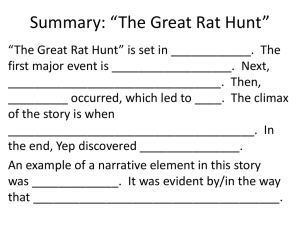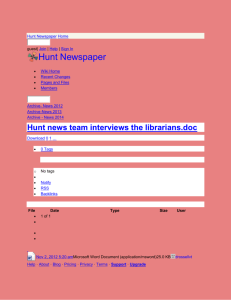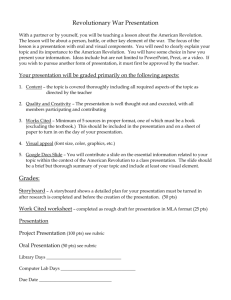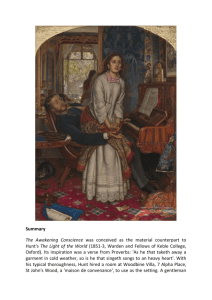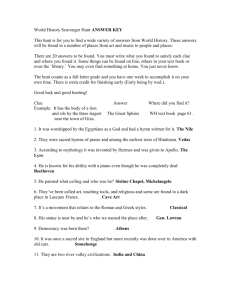Modern European History, 1848-present
advertisement
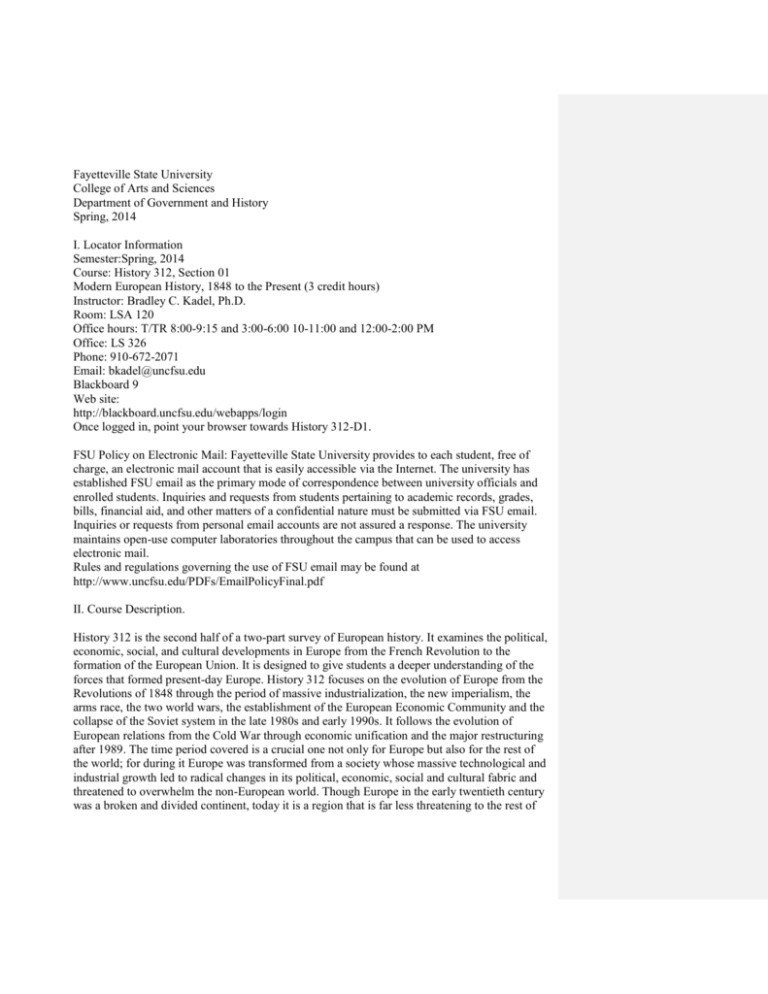
Fayetteville State University College of Arts and Sciences Department of Government and History Spring, 2014 I. Locator Information Semester:Spring, 2014 Course: History 312, Section 01 Modern European History, 1848 to the Present (3 credit hours) Instructor: Bradley C. Kadel, Ph.D. Room: LSA 120 Office hours: T/TR 8:00-9:15 and 3:00-6:00 10-11:00 and 12:00-2:00 PM Office: LS 326 Phone: 910-672-2071 Email: bkadel@uncfsu.edu Blackboard 9 Web site: http://blackboard.uncfsu.edu/webapps/login Once logged in, point your browser towards History 312-D1. FSU Policy on Electronic Mail: Fayetteville State University provides to each student, free of charge, an electronic mail account that is easily accessible via the Internet. The university has established FSU email as the primary mode of correspondence between university officials and enrolled students. Inquiries and requests from students pertaining to academic records, grades, bills, financial aid, and other matters of a confidential nature must be submitted via FSU email. Inquiries or requests from personal email accounts are not assured a response. The university maintains open-use computer laboratories throughout the campus that can be used to access electronic mail. Rules and regulations governing the use of FSU email may be found at http://www.uncfsu.edu/PDFs/EmailPolicyFinal.pdf II. Course Description. History 312 is the second half of a two-part survey of European history. It examines the political, economic, social, and cultural developments in Europe from the French Revolution to the formation of the European Union. It is designed to give students a deeper understanding of the forces that formed present-day Europe. History 312 focuses on the evolution of Europe from the Revolutions of 1848 through the period of massive industrialization, the new imperialism, the arms race, the two world wars, the establishment of the European Economic Community and the collapse of the Soviet system in the late 1980s and early 1990s. It follows the evolution of European relations from the Cold War through economic unification and the major restructuring after 1989. The time period covered is a crucial one not only for Europe but also for the rest of the world; for during it Europe was transformed from a society whose massive technological and industrial growth led to radical changes in its political, economic, social and cultural fabric and threatened to overwhelm the non-European world. Though Europe in the early twentieth century was a broken and divided continent, today it is a region that is far less threatening to the rest of the world. After the political revolutions in Eastern Europe, the entire continent transformed both itself and its relationship to the wider global community. This course will explore in depth this transformation in an effort to better understand contemporary European society as well as the impact that Europe has had on the globe. Prerequisites: HIST 110, HIST 120, hist311, or consent of the instructor. III. Disabled Student Services: In accordance with Section 504 of the 1973 Rehabilitation Act and the Americans with Disabilities Act (ACA) of 1990, if you have a disability or think you have a disability to please contact the Center for Personal Development in the Spaulding Building, Room 155 (1st Floor); 910-672-1203. Please note that all materials in this course should meet 508 Federal standards for accessibility. If any student has difficulty accessing information due to a disability, please notify the instructor so that alterations can be made or an alternative format can be found. IV. TEXTBOOKS: Hunt, lynn et al. The Making of the West, Volume II: Since 1500 New York, Bedford/St. Martins, 2005 ISBN: 0-312-45668-9 Companion web site: http://bcs.bedfordstmartins.com/huntconcise1e Browning, Christopher. Ordinary Men Reserve Police Battalion 101 and the Final Solution in Poland. New York: Harper Perennial, 1992. . Drakulic, Slavenka. New York: Penguin,2011.. ISBN: 0140277722 V. Student Learning Outcomes. Upon completion of this course, students will be able to: • Trace social, political, and cultural changes associated with rise of nation-states in Europe • Chart European expansion into other world areas and cite effects of this expansion on Europeans • Trace the progress of the Industrial Revolution and assess its effects on Europe • Analyze the causes and assess the influence of political revolutions in Europe on individuals, governing bodies, and church-state relations • Draw relationships between continuity and change in explaining human history by • Analyze and trace developments in literary, artistic, and religious traditions over time as legacies of past societies • Cite those phenomena which represent revolutionary breaks with the past and assess their impact on human history • Distinguish between historical fact and interpretation while identifying declining and emerging trends. • Understand the flow of major historical events in Europe, their interconnectedness, and their causes and impacts upon the world • Define historical terms, major European regimes, and causes of political conflict without the use of books or other materials • Trace historical patterns and events to more contemporary problems and issues History Program outcomes: Program Outcome 1: Writing Skills: Part I: Following Directions: 1. Introduction: 2. Conclusion: 3. Supporting evidence in the body 4. Paraphrasing 5. Citations Write critically and analytically (DPI 1.5), (NCSS 2.1); Program Outcome 1: Writing Skills Part II: Use of Historical Sources based on availability 1. Use of Primary Sources 2. Use of Secondary Sources 3. Use of Internet Sources 4. Use of Journal Sources Apply historical methodology by utilizing both primary and secondary sources including journals, monographs, and the plastic arts. (DPI 1.5), (NCSS 2.1); Note that students will take part in a pre-test/post-test based on evidence-based writing assignments in which they analyze documents and write an essay for which they choose a course of action. VI. Course Requirements and Evaluation Criteria. Computer hardware: Access to a computer and the internet is required for this class. Though there are no concrete requirements for the type of computer, you will need to have access to a machine that can browse the internet and run the programs listed below. Software: Students will need to have access to the following programs: Acrobat Reader, MS Word, MacroMedia Flash,and an internet browser such as Internet Explorer or Firefox. Please note that make-ups for missed examinations and quizzes are given at the discretion of the instructor. In general, make-ups must be taken within one week of the original date of the exam or quiz. Academic Honesty: Students should be aware that a university is a community of scholars committed to the discovery and dissemination of knowledge and truth. Without freedom to investigate all materials, scrupulous honesty in reporting findings, and proper acknowledgment of credit, such a community can not survive. Students are expected to adhere to the highest traditions of scholarship. Infractions of these traditions, such as plagiarism (cheating), are not tolerated. Keep in mind that misrepresenting someone else's words or ideas as one's own constitutes plagiarism. In cases where plagiarism occurs, the instructor has the right to penalize the student(s) as he or she thinks appropriate. The first offence will result in failure of the assignment with a grade of 0 points, the second offence in failure of the course. Students who wish to contest a finding of academic dishonesty may invoke the process outlined in the FSU Student Handbook. Please note that all student work will be checked through the turnitin.com website in order to check the authenticity of student writing. Late work: Students are required to turn work in on time, according to the deadline set in the course syllabus. Late work will be penalized at least 10%. Work turned in more than a week late will result in a failing grade for that assignment. Evaluation: Grades will be calculated by way of the following point system: Description of research topic: 10 pts. Bibliography for research paper 15 pts. Midterm exam - 50 pts. Final exam - 75 pts. Two essays - 50 pts. Each: 100 pts. Rough draft of research assignment: 50 pts. Final research assignment: 75 pts. Class presentation: 25 pts. Quizzes: 50 pts. Participation: 50 pts. 500-458 = A/100-92% 457-413 = B/91/83% Formatted: Indent: Left: 0", Hanging: 0.5" 412-358 = C/82-73% 357-312 = D/72-64% Please note: If these evaluation criteria must be revised because of extraordinary circumstances, the instructor will distribute a written amendment to the syllabus. Formatted: Indent: Left: 0", Hanging: 0.5" 500-458 = A/100-92% 457-413 = B/91/83% 412-358 = C/82-73% 357-312 = D/72-64% VII. Academic Support Resources. Please note that our course website includes links to important academic resources such as guidelines for citing sources and useful online historical archives. Students should be aware that the university possesses a number of resources to assist in student success such as a Writing Center and academic advisement. VIII. Course Schedule. Note that additional primary source materials may be assigned in class and will be posted on the course web site under Primary Sources. Week 1 – January 14 and 16 Reading: Hunt, Chapter 17, “Industrialization and Social Ferment,” (specially Section on Revolution 1848)and Karl Marx, the Communist Manifesto, under Primary Sources on our course web site. • Begin to identify research paper topic Week 2: January 21 and 23 Reading: Review Hunt, Chapter 17, and complete Karl Marx’s Communist Manifesto. Description of research paper due Jan 23 Week 3 - January 28 and 30 • Reading: Hunt, “Constructing the Nation State;” and and Johann Gottfried von Herder, Materials for the Philosophy of the History of Mankind under Primary Sources on our course web site. Topics discussed: nationalism, German and Italian Unification, Second Industrial Revolution Week 4 - February 4 and 6 • Reading: review Hunt, “Constructing the Nation State;” • Bibliography in Chicago Manual of Style format due Feb. 6 Topics discussed: Primary and secondary sources, research topics, rise of German power and decline of British industrial strength Week 5 – February 11 and 13 • Reading: Hunt, “Empire, Modernity, and the Road to War;” begin Ordinary Men.” Topics discussed: Imperialism, Scramble for Africa, and nationalist rivalries Week 6 – February 18 and 20 • Reading: Review Hunt, “Empire, Modernity, and the Road to War;” and continue Ordinary Men. • Meet with instructor to go over research paper by Feb. 20 Topics discussed: New Alliance System, Russia and Revolution, Bower War, Week 7 – February 25 and 27 • Reading: Hunt, “War, Revolution, and Reconstruction;” and Ernst Junger, Storm of Steel under primary sources on our course web site. • Rough draft of research paper due Feb. 27 in class and through turnitin.com under assignments on our course web site Topics discussed: The Road to War, the Balkans, and question of a democratic Europe Week 8: March 4 and 6 • Reading: Hunt, “War, Revolution, and Reconstruction;” and Ernst Junger, Storm of Steel.and complete Christopher Browning, Ordinary Men. Topics Discussed: The Great War and the Trench Experience Midterm exam March 6 in class March 10-15 – Spring Break Week 9: March 15 and 17 • Reading: Hunt, “War, Revolution, and Reconstruction Class Presentations Week 10 – March 18 and 20 • Reading: Hunt, “War, Revolution, and Reconstruction Book review of Christopher Browning due March 22 Topics discussed: Russian Revolution and Civil War, Weimar Republic, Treaty of versaille Week 10 – March 25 and 27 Reading: Hunt, “An Age of Catastrophes, 1929-1945.” Topics discussed: The Great Depression, the rise of fism, and the Fony War Week 11 – April 1 and 3 • Reading: Hunt, “Remaking Europe in the Shadow of the Cold War,” George Kennan, “The Long Telegram;” and begin Café Europa. Topics Discussed: World War II and its aftermath, the welfare state Week 12: April 8-10 • Reading: review Hunt, “Remaking Europe in the Shadow of the Cold War;, and continue Café Europa. Week 13: April 15 and 17 • Reading: Hunt, “Postindustrial Society and the End of the Cold War;” and conclude Café Europa. • Book review of Café Europa due by April 17 through the assignments folder Topics discussed: the 1970s, Thatcherism, and fall of communism Week 14: April 22 and 24 • Reading: Review Hunt, “Postindustrial Society and the End of the Cold War.” Final draft of research paper due April 22 Week 15 Final Exam Week Final exam: To Be Anounced IX. TEACHING STRATEGIES The pedagogical Methodologies used in this course will include lectures, study sessions and tutorials, seminar discussions, and classroom debates. Throughout the course emphasis upon developing critical historical thinking, cause and effect relationships, and collegial behavior within a professional environment will be emphasized. Significance of events will be explained, questioned, and challenged. Students are expected to gain skill in the use of these forms of study aids. In addition, students will receive personal feedback on research and writing and will be expected to make revisions and rewrites of assigned work. X. Bibliography Fayetteville State University Faculty Handbook http://www.uncfsu.edu/acadaff/pdf/fachandbook702.pdf FSU Student Handbook http://www.uncfsu.edu/handbook/ FSU Mission Statement http://www.uncfsu.edu/handbook/ pdf/Web%20pdf/universitymission.pdf The Code of the University of North Carolina (of which FSU is a constituent institution) and the FSU Code of Student Conduct affirm that all students have the right to receive instruction without interference from other students who disrupt classes. FSU Core Curriculum Learning Outcome under Ethics and Civic Engagement (6.03): All students will “prepare themselves for responsible citizenship by fulfilling roles and responsibilities associated with membership in various organizations.” Each classroom is a mini-community. Students learn and demonstrate responsible citizenship by abiding by the rules of classroom behavior and respecting the rights all members of the class. The FSU Policy on Disruptive Behavior (see FSU website for complete policy) identifies the following behaviors as disruptive: 1. Failure to respect the rights of other students to express their viewpoints by behaviors such as repeatedly interrupting others while they speak, using profanity and/or disrespectful names or labels for others, ridiculing others for their viewpoints, and other similar behaviors; 2. Excessive talking to other students while the faculty member or other students are presenting information or expressing their viewpoints. 3. Use of cell phones and other electronic devices 4. Overt inattentiveness (sleeping, reading newspapers) 5. Eating in class (except as permitted by the faculty member) 6. Threats or statements that jeopardize the safety of the student and others 7. Failure to follow reasonable requests of faculty members 8. Entering class late or leaving class early on regular basis 9. Others as specified by the instructor. The instructor may take the following actions in response to disruptive behavior. Students should recognize that refusing to comply with reasonable requests from the faculty member is another incidence of disruptive behavior. 1. Direct student to cease disruptive behavior. 2. Direct student to change seating locations. 3. Require student to have individual conference with faculty member. At his meeting the faculty member will explain the consequences of continued disruptive behavior. 4. Dismiss class for the remainder of the period. (Must be reported to department chair.) 5. Lower the student’s final exam by a maximum of one-letter grade. 6. File a complaint with the Dean of Students for more severe disciplinary action. Students who believe the faculty member has unfairly applied the policy to them may make an appeal with the faculty member’s department chair.
